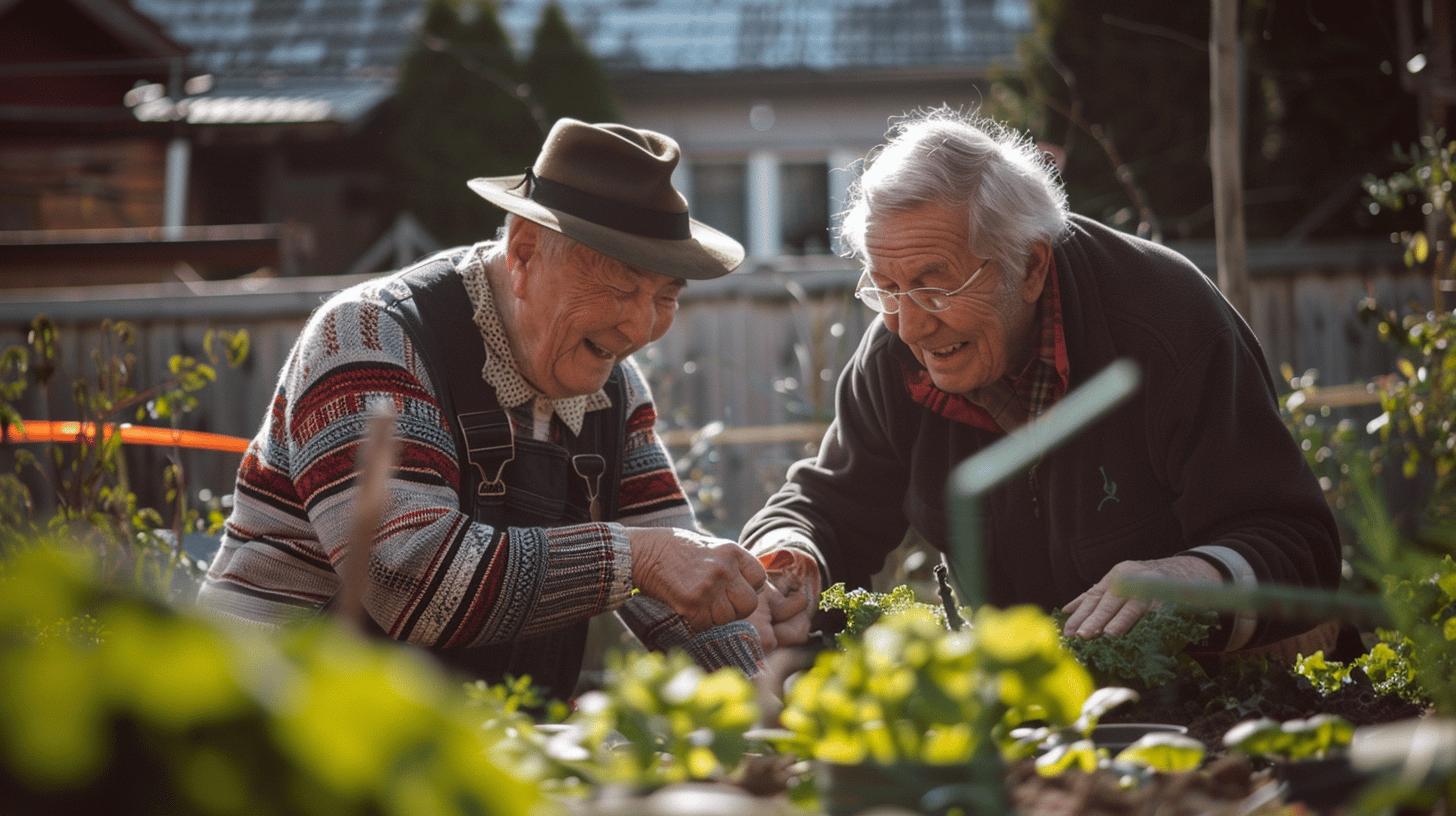Is emotional development in older adulthood a neglected topic? Despite the common narrative that aging is predominantly a period of decline, older adults often experience increased emotional stability and happiness. However, these positive changes come with their own unique challenges. In this article, you'll uncover the key emotional shifts that happen as people age and how they impact overall well-being. Join us as we explore the intricate balance of emotional growth and stability in later life.
Key Emotional Changes in Older Adulthood
Emotional changes in older adults often include increased emotional stability and a stronger focus on positive life aspects. As people age, they tend to report fewer negative emotions compared to younger individuals. This shift towards emotional stability contributes to an overall higher sense of well-being in older adults.
Despite these positive trends, older adults face specific challenges that require additional support. For instance, the loss of loved ones, changes in physical health, and adjustments in their living situations can introduce emotional stress. These challenges can sometimes offset the benefits of increased emotional stability.
- Increased emotional stability
- Greater focus on positive experiences
- Reduced intensity of negative emotions
- Higher overall well-being
- Challenges due to life changes and losses
Older adults often experience a blend of emotional resilience and vulnerability. While they may be better equipped to handle everyday stress and maintain a positive outlook, significant life events can still have a profound impact. Understanding these common emotional changes can help in providing the necessary support and fostering a healthier emotional environment for older adults.
Theories of Emotional Development in Older Adulthood

Emotional development in older adulthood is a complex process influenced by various psychological theories. These theories provide insights into how emotional well-being can evolve with age, despite the challenges that may arise.
Erikson's theory of psychosocial development is one of the most well-known frameworks for understanding emotional growth in older adults. According to Erikson, the final stage of development, which occurs in late adulthood, is characterized by the conflict between integrity and despair. Older adults reflect on their lives, seeking a sense of meaning and fulfillment. Successfully resolving this conflict leads to feelings of wisdom and satisfaction, while failure results in regret and despair.
The Socioemotional Selectivity Theory (SST) offers another perspective on emotional development in older adults. SST posits that as people age, they become more selective about their social interactions, prioritizing emotionally meaningful relationships. This shift is driven by a recognition of limited time, leading older adults to focus on positive experiences and avoid negative ones. This theory helps explain why older adults often report higher levels of emotional well-being and satisfaction.
Strength and Vulnerability Integration (SAVI) Theory provides a nuanced understanding of emotional development in older adulthood. SAVI suggests that while older adults generally experience increased emotional stability, they may also face heightened vulnerability to stress from significant life events. This theory emphasizes the balance between emotional resilience and susceptibility, highlighting the importance of coping mechanisms and support systems in maintaining emotional health.
| Theory | Description |
|---|---|
| Erikson’s Psychosocial Development | Focuses on the conflict between integrity and despair, seeking meaning in life. |
| Socioemotional Selectivity Theory (SST) | Prioritizes emotionally meaningful relationships and positive experiences. |
| Strength and Vulnerability Integration (SAVI) | Balances emotional stability with vulnerability to significant stressors. |
Coping Mechanisms for Emotional Challenges in Older Adults
Maintaining emotional well-being in older adults is crucial, especially as they navigate the unique challenges of aging. Staying engaged and maintaining independence are key components of emotional health. When older adults lose a sense of autonomy, it can lead to feelings of helplessness and depression. Coping mechanisms can help mitigate these feelings and promote a sense of purpose and control.
Hobbies and daily tasks play a significant role in managing emotions in late adulthood. Simple activities like gardening, cooking, or even light exercise can provide a routine and a sense of accomplishment. Engaging in these activities helps keep the mind active and can alleviate boredom, which is particularly important post-retirement. Keeping busy with meaningful tasks can also foster a sense of independence.
Another effective strategy is maintaining social connections. Strong relationships can offer emotional support and reduce feelings of loneliness. Interacting with family, friends, or participating in community groups can provide a network of support, making it easier to cope with emotional challenges. Social engagement not only boosts emotional well-being but also enhances overall quality of life.
- Engage in hobbies: Activities like gardening or cooking.
- Stay physically active: Light exercise or daily walks.
- Maintain social connections: Interact with loved ones and community groups.
- Pursue lifelong learning: Take up new skills or hobbies.
- Establish routines: Create a daily schedule.
- Seek professional support: Counseling or support groups.
By incorporating these coping mechanisms, older adults can better manage emotional challenges and maintain a higher quality of life.
The Impact of Social Connections on Emotional Health in Older Adults

Social connections play a vital role in the emotional health of older adults. As people age, they often focus more on the positive aspects of life and less on the negative ones. This shift can be significantly influenced by the quality and quantity of their social interactions.
Strong social support networks are crucial for mitigating feelings of loneliness and depression in older adults. These networks provide emotional support, companionship, and a sense of belonging. Engaging with family, friends, and community groups can lead to higher levels of emotional well-being. Studies show that older adults with robust social connections tend to report greater life satisfaction and lower levels of stress.
Having a network of supportive relationships can also help older adults navigate significant life changes, such as retirement or the loss of a loved one. These connections offer practical assistance and emotional encouragement, making it easier to cope with life's challenges. Regular social interaction can also stimulate cognitive function and provide opportunities for meaningful engagement.
- Join community groups: Engage in local clubs or organizations.
- Stay in touch with family: Regular communication with relatives.
- Participate in social activities: Attend events or social gatherings.
- Use technology: Leverage social media and video calls to connect with others.
By enhancing social connections, older adults can improve their emotional health and overall quality of life.
Emotional Resilience and Growth in Older Adulthood
Emotional resilience plays a crucial role in handling life's challenges, especially in older adulthood. As individuals age, they often face significant life changes such as retirement, loss of loved ones, and health issues. Emotional resilience, which includes the ability to recover from stress and adapt to new circumstances, becomes vital. This resilience is not determined by gender but by a combination of coping mechanisms, self-awareness, and support systems. Older adults tend to develop greater emotional intelligence and patience, allowing them to navigate interpersonal disagreements more effectively.
Emotional growth continues even in older adulthood, with many experiencing improvements in wisdom and a broader perspective on life. This growth is often characterized by an increased capacity for empathy, better emotional regulation, and a deeper sense of fulfillment. Older adults may find that their ability to reflect on past experiences enables them to handle current challenges with greater ease and understanding. This ongoing development contributes to emotional strength and overall well-being.
- Engage in mindfulness practices
- Maintain social connections
- Pursue lifelong learning
- Stay physically active
- Seek professional support when needed
By fostering emotional resilience through these strategies, older adults can enhance their ability to face life's challenges and continue growing emotionally.
The Role of Lifestyle in Emotional Development of Older Adults

Lifestyle choices play a pivotal role in shaping the emotional development of older adults. As cognitive functions may decline with age, maintaining an active lifestyle becomes essential for emotional health. Simple day-to-day tasks and hobbies can help older adults feel a sense of control and purpose, contributing positively to their emotional well-being.
One significant lifestyle factor that enhances emotional well-being is physical activity. Regular exercise not only keeps the body fit but also boosts mental health by reducing stress and anxiety levels. Activities like walking, swimming, or even light stretching can improve mood and overall life satisfaction. Additionally, social interaction through community groups or clubs offers emotional support and a sense of belonging, which are crucial for mitigating feelings of loneliness and depression.
Another important factor is engaging in meaningful activities. Hobbies such as gardening, cooking, or crafting provide a sense of accomplishment and help maintain cognitive health. Pursuing lifelong learning through classes or new skills can stimulate the mind and keep it active. These activities not only prevent boredom but also foster emotional satisfaction by giving older adults something to look forward to each day.
| Lifestyle Factor | Impact on Emotional Well-being |
|---|---|
| Physical Activity | Reduces stress and anxiety, improves mood |
| Social Interaction | Provides emotional support, reduces loneliness |
| Engaging in Hobbies | Maintains cognitive health, provides a sense of accomplishment |
| Lifelong Learning | Stimulates the mind, prevents boredom |
Final Words
Understanding emotional development in older adulthood reveals that emotional stability and positivity often increase with age.
Despite these benefits, older adults may face unique challenges that require support.
Different theories, such as Erikson's and the Socioemotional Selectivity Theory, provide insight into these emotional changes.
Engaging in various coping mechanisms and maintaining social connections play a crucial role in managing emotions during this stage.
By focusing on emotional resilience and making positive lifestyle choices, older adults can maintain and enhance their emotional well-being.
Embracing these strategies can lead to a fulfilling and emotionally rich older adulthood.
FAQ
What are the emotional changes in older adulthood?
Older adulthood often includes increased emotional stability and a focus on positive aspects of life. However, older adults may also face challenges that require additional support.
What is the emotional development in adulthood?
Emotional development in adulthood typically shows increased emotional stability, greater emotional intelligence, and an ability to handle stress better. Wisdom and patience also tend to improve.
What are some emotional milestones for a typically developing older adult?
Older adults typically demonstrate emotional milestones such as increased resilience, improved emotional intelligence, enhanced patience, and a stronger focus on positive experiences.
How do emotions generally change through adulthood?
As people age, emotions generally become more stable and positive. Older adults report fewer negative emotions and tend to handle stress and interpersonal conflicts better.


